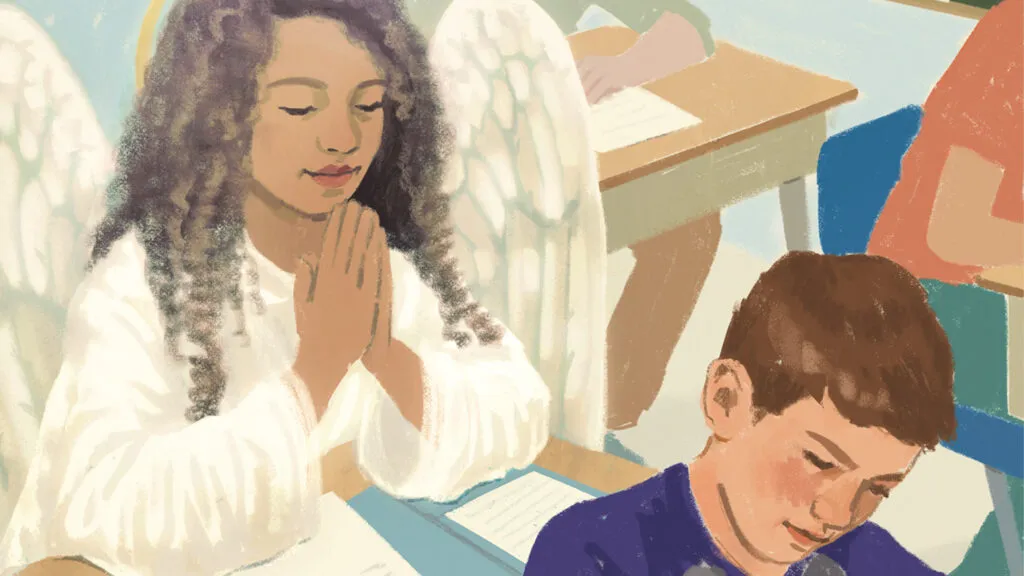With my degree in education and an internship in a high school under my belt, I felt ready for my first real job teaching fourth graders. I prepared clear lesson objectives and plans for how to meet them. I broke down complicated ideas into concepts kids at this level could understand. Then I got into the classroom, and it all fell apart. Why isn’t this working? I thought at the end of another discouraging day.
Many of my students were living in poverty, which could make every aspect of their lives more difficult. I knew that going in, but I thought I had the tools to reach any child. I didn’t. I failed to keep the class focused. Students ran around, sometimes got into fights, then flew out the door the second the bell rang.
One child in particular really concerned me. I pushed in the chair at his empty desk. He barely paid attention and sometimes fell asleep on his books. I suspected he wasn’t getting enough to eat at home. Other children made fun of his dirty clothes. How could I begin to make a difference?
It was tempting to think my job was impossible, but I knew that wasn’t true. I had proof right across the hall, in Marcia’s classroom. Marcia taught third grade. She was a bundle of energy, a ray of sunshine in her kids’ lives. The children ran up to her in the hall, gave her hugs. My kids don’t even like me, I thought, turning out the lights in my room.
“See you tomorrow!” Marcia called as I passed her door.
Tomorrow, I thought. Is there something I could do differently? I’d already tried every prompt and technique I’d learned in school. Maybe I had more to learn from the best teacher I knew: Marcia.
The next day, while my children were at gym class, I asked Marcia if I could observe her for a while. What a contrast. “How about a song,” she said, taking out a guitar. “A song about verbs!” The children cheered.
Who had time for singing? How would Marcia ever get through her lessons? I spent my whole day watching the clock, watching the minutes slip away without progress. Marcia seemed to have all the time in the world—not just for singing, but for each child. When one even looked a bit lost, she walked over to the student’s desk and dropped to her knees to give up-close attention. And that was just the beginning. Her students were engaged, always interested in the lesson. The only difference between our classrooms was Marcia herself.
I couldn’t wait to put some of the things I’d learned into practice. It wasn’t easy at first, ignoring my lesson plans. But I discovered I enjoyed walking from desk to desk, talking to my students one-on-one, getting to know them as individuals. They responded in kind. Following Marcia’s lead, I broke them into small groups to work together, and moved desks around in clusters for special projects.
Marcia liked what she saw when she came to my room at the end of the week. But even with all my new skills, it wasn’t enough to reach the student I was most worried about. “He just can’t focus, won’t do his homework,” I told her in private.
“Friend,” Marcia said seriously, “this might not be easy for you to hear. But if he’s not learning, you’re not teaching.”
“What more can I do? I fear he won’t pass the state test at the end of the year. I don’t know how to make the lessons any simpler—”
“You’re not teaching a lesson,” said Marcia, cutting me off. “You’re teaching a child. The child comes first, every time. He’s more important than reading or writing or any state test. You have to give him whatever he needs to learn.”
“But how?”
“We start with his physical needs,” Marcia said. “Then we get to know him.”
“I have his records from last year…” I said.
“Don’t bother with that. He needs a fresh start. On Monday, I want you to come to school with a loaf of bread, peanut butter and jelly. Set up a special place for him—that closet is a good spot, if you move your supplies. Bring a bar of soap and a washcloth for him to use at the sink. Collect some clean clothes for him.” Marcia gave me a wink. “That’s your homework.”
I was prepared on Monday. At recess, I asked the young man to stay inside with me. “I have a surprise,” I said. I led him to the sink and offered him the washcloth for his hands and face. Then came the difficult part. “Your momma needs your help,” I told him. “I’m going to help you help her by teaching you how to stay clean and make a sandwich. Do you think you can do that?”
He nodded. I showed him where I’d set up a desk, a place where he could go if he wanted to take a break or even a nap, or to change into the fresh clothes I’d brought. “This is your spot whenever you need it,” I explained to him.
The other children noticed him in his special place when they returned, but they understood he wasn’t in trouble. Later on, I sent him to the office with a note so I could talk to the class about how bad it feels to be made fun of. Once the children imagined how they would feel in his place, they didn’t want to tease him anymore. There would be no state test on compassion, but I couldn’t think of a more important lesson for anyone.
Marcia’s advice wasn’t just for students in dire circumstances. Every student had things going on in their life that affected their progress. I started paying attention to expressions and body language. If I saw frustration, we’d all gather on the floor for a story or a snack. Most times, the kids returned to their lesson rejuvenated.
I began to look forward to work each day. I arrived early, but never before Marcia. One morning, I noticed her standing by one of her students’ desks.
“What are you doing?” I asked.
“Every morning I stop by each desk to pray for the student who sits there,” she said. Leave it to Marcia to have one more lesson to teach me, perhaps the most important one of all.
Marcia left our school at the end of the year, but her legacy lived on in the students she prepared for the world, and also in me. She inspired me every day of my 40-year career, as I thanked God for giving me the chance to teach each child, and for sending Marcia to teach me.
For more angelic stories, subscribe to Angels on Earth magazine.






